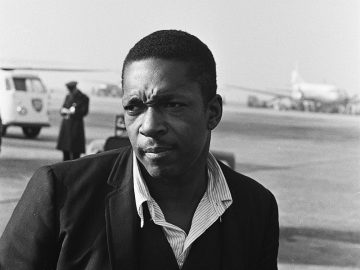Ismael Muhammad in The Paris Review:
 The John Coltrane Quartet’s “Alabama” is a strange song, incongruous with the rest of the album on which it appears. Inserted into Coltrane’s 1964 album Live at Birdland, it’s a studio track that confounds the virtuosic post-bop bliss of the album’s first three tracks, live recordings that include a jittery rendition of Mongo Santamaria’s “Afro Blue.” All of that collapses when we reach the sunken melancholy of “Alabama.” We are far, now, from the cascades of sound that Coltrane introduced us to in “Giant Steps,” far from the sonic innovations and precise phrasing he refined in this album’s live recordings. Here, Coltrane’s saxophone sounds hoarse and enfeebled, until it collapses on the threshold of a hole in the ground.
The John Coltrane Quartet’s “Alabama” is a strange song, incongruous with the rest of the album on which it appears. Inserted into Coltrane’s 1964 album Live at Birdland, it’s a studio track that confounds the virtuosic post-bop bliss of the album’s first three tracks, live recordings that include a jittery rendition of Mongo Santamaria’s “Afro Blue.” All of that collapses when we reach the sunken melancholy of “Alabama.” We are far, now, from the cascades of sound that Coltrane introduced us to in “Giant Steps,” far from the sonic innovations and precise phrasing he refined in this album’s live recordings. Here, Coltrane’s saxophone sounds hoarse and enfeebled, until it collapses on the threshold of a hole in the ground.
In “Alabama,” Coltrane asks us to bear witness to this hole in the ground, which is also a hole in America’s story, which is also a hole in the heart of black Americans. He wants us to grieve alongside him at this absence. The quartet recorded the track in November 1963, two months after the bombing of the 16th Street Baptist Church in Birmingham, Alabama, made an absence of four little black girls. When I listen to Coltrane playing over Tyner’s piano I hear smoke rising up from a smoldering crater, mingling with the voices of the dead. He asks us to peer down into the hole, to toss ourselves over into this absence. Just past the one-minute mark, even this funeral dirge collapses in on itself, as Coltrane’s saxophone sinks into a descending arpeggio, coaxing us in.
…I started listening to and thinking about “Alabama” a lot in the aftermath of Philando Castile’s murder in the summer of 2016, which was reminiscent of the murders of Samuel DuBose, Alton Sterling, Terence Crutcher, Walter Scott, Jamar Clark, Sandra Bland, and countless others. I’d lay down and loop the song through my bedroom speakers because the sonic landscape that Coltrane conjures on the track suggests something about the temporality in which black grief lives, the way that black people are forced to grieve our dead so often that the work of grieving never ends. You don’t even have time to grieve one new absence before the next one arrives. (We hadn’t time to grieve Ahmaud Arbery before we saw the video of Floyd’s murder.) “Alabama” gives this unceasing immersion in grief a form. It’s there in the song’s disconcerting stops and starts, its disarticulated notes, its willingness to abandon virtuosity in favor of a style of playing that is repetitive, diffuse, tentative, and dissonant.
More here.
